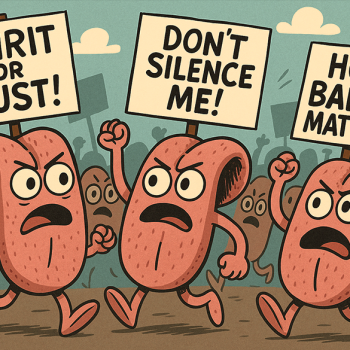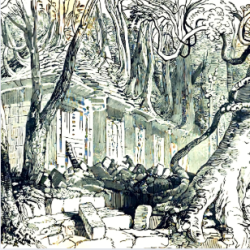 Once again, the end of the earth is in the news.
Once again, the end of the earth is in the news.
According to a reporter for The Washington Post, a loosely orchestrated movement is spreading the word from Connecticut to Arkansas on billboards, cars, and even a website. Others are even planning missions to Africa, Latin America, and the Middle East to spread the word.
Make a note of the date: May 21, 2011.
Or not.
The latest prediction is based on the work of Harold Camping who, reading the Bible "like a cosmic calendar," takes the founding of Israel in 1948 as the starting point for his calculations. While Camping's movement will strike many people as a fairly eccentric phenomenon on the American spiritual landscape, it resonates, of course, with similar approaches to Scripture and even with secular world-ending scenarios. Tim LaHaye popularized this approach to the Bible for a new generation in his Left Behind series; and a perennial trend in cinema have been films that chronicle the end of the world, often without help from God at all. In 2010 alone, Hollywood took the planet to the brink of extinction in The Road, The Book of Eli, Daybreakers, Legion, Survival of the Dead, The Crazies, Red Dawn, and Priest.
What does this cultural preoccupation tell us about our spiritual needs?
One, we live in stories. Narratives shape our lives. Some of those stories are private narratives and are lived out on a smaller scale. Others are all-encompassing stories within which our private stories find meaning. But whether they are big or small, short or long, we use stories to explain ourselves.
Two, the larger stories are indispensable. It is only in telling our stories in that larger context that we find meaning and significance. It is through storytelling that we explain the place we occupy in families, communities, and even the larger human experience.
Three, the way the story ends tells us something about the whole of the story: where we are all going, what is important to us (or should be), why we live the way we do.
I think the preoccupation also tells us something about the state of our souls: Apocalyptic, world-ending scenarios give some of us a chance to face our fears.
For others, such scenarios are about running from their fears.
And, whether we are facing those fears or running from them, world-ending accounts are almost always about our fear of dying.
Some tell stories about the end to remind themselves that they will not be extinguished by dying. Others tell them hoping to be "raptured"—taken up into heaven—before they are forced to face their mortality.
There is no way to prove it, but I suspect that, above all, it's our fear of dying that gives world-ending scenarios their perennial appeal.
Any conversation about what the Bible does or doesn't say about the end of the world quickly loses track of those issues. That's understandable. As one who has spent a fair amount of time thinking and writing about the way in which we interpret the Book of Revelation and similar parts of scripture, I appreciate the importance of those conversations.
Far too many people assume that the "left behind" approach to scripture is the only orthodox approach to some parts of scripture and yet it is neither the only approach available, nor is it particularly orthodox. In fact, it doesn't even make a great deal of sense to read the Book of Revelation as if it were a roadmap to current events. Knowing something about the historical context in which scripture was written helps explain why the Apostle Paul recommended that some Christians avoid eating meat sacrificed to idols. So, why would it make sense to read the Book of Revelation as if it were a crystal ball filled with information about the future? As I've said to my students, it is counterintuitive, if not just simply strange, to read as if over two millennia ago in Asia Minor, a Greek-speaking writer wrote to a Greek-speaking congregation, and upon reading it, they concluded, "We don't have any idea what it means, but people living two thousand years from now on a continent that has yet to be discovered, in a country that has yet to be founded, living under circumstances no one can now imagine, speaking a language that has yet to develop will understand it."
That said, however, the spiritual issues remain. And people will continue to be fascinated with world ending scenarios. It's worth asking ourselves:
Do the shape of those stories prompt us to live in deeper dependence upon God or on yet another world-ending scenario?





